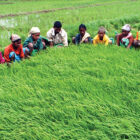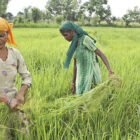Sunita, a smallholder farmer in India, barely ever receives a price higher than the production cost for her corn; nor does Abike for her wheat in Nigeria, even though demand is soaring. Both – like the majority of the world’s farmers – are tormented by cheaper imports fuelled by agricultural trade agreements within the World Trade Organisation (WTO) framework. This drives down the farmgate prices for farmers in food-importing countries while incentivising industrial agricultural production in food-exporting countries, which depends on extensive use of fertilisers, energy and pesticides, and contributes to biodiversity loss.
This unsustainable use of inputs also contributes to global greenhouse gas emissions and accelerates climate change. Failing food systems impose enormous economic and social costs that drive rural people into abject poverty. This is one of the primary reasons for the largest migration in human history of people silently moving out of the countryside, leaving the farms for urban spaces or destinations unknown in search for better livelihoods and opportunities. However, recently, 16 UN ambassadors wrote to the UN Food Systems Summit stating that “international agricultural trade is critical for global food security and poverty eradication.”
Even after 25 years of ratification of treaties on agricultural trade, today one in every nine people globally goes to sleep hungry, while around a third of the food produced is lost or wasted. For a world that achieves such seemingly impossible milestones in science and technology, such as landing a rover on planet Mars, which is also collecting soil samples to return to Earth, surely something as basic as feeding the hungry should not have been so elusive.
Ironically, the majority of the poor and chronically hungry in the world are farmers who are tasked with producing the food and who depend on agriculture for their livelihoods. Meanwhile, the obese generally belong to the food-buying categories: the consumers. In that regard, there is also a correlation between the WTO’s treaty and the state of the world’s farmers. A primary cause of the failure to transform food systems has been discussions being confined to silos of political boundaries. The WTO treaty on agriculture is the antithesis of a food systems approach because it prioritises economic and political considerations over the need to stay within the nine planetary boundaries within which humanity can continue to develop and exist safely. The UN ambassadors are right: international agricultural trade is important – but this cannot imply that agricultural trade treaties are sacrosanct, especially when they harm the vast majority of producers. The attempt to change is being held back by the legacy and the rules of the system itself.
The statement of the UN Special Rapporteur on the Right to Food, Michael Fakhri, asked “What if the table is already set, the seating plan non-negotiable, the menu highly limited? And what if the real conversation is actually happening at a different table?” Efforts to meet the people’s expectations and the targets that the world has repeatedly set for itself remain unfulfilled – be they on biodiversity loss, poverty or undernutrition (all measured by the Food Sustainability Index), or the objectives of the earlier UN Food Summits.
For shattered communities, with generations of broken promises on the one hand, and changing governments and trillions of dollars spent on the other, we have been unable to change the multiple trajectories converging towards a tipping point. This has given rise to scepticism about the intent and the processes seeking to drive change. Now, sadly, some sections of civil society have decided to boycott the Food Systems Summit, believing it will only reinforce the existing pathways, which is not true.
The more we unravel the maze, the more apparent it becomes that the table was set a long time ago with the WTO agreement, or even earlier – where some privileged nations made the rules for poorer nations to follow. Even the UN Security Council needs proportionate representation from the global south. The proposals of the Food Systems Summit are not binding on member states; their adoption is voluntary. Countries are expected to take positions on the proposals by interpreting scientific evidence in line with their national priorities. It’s not that the countries lack the knowledge; instead they lack the political will and savviness to navigate on their home ground.
The table is set in other ways too. I believe that, in developing nations, international consultancy firms and research institutions with links to multilateral agencies, foreign grants and big business often have more of a bearing on a country’s food policies, especially when compared to national or government-associated research institutions who are usually under-funded. Even the measurement metrics that have emerged, like defining poverty at a lowly US$1.90 a day or using GDP as the indicator of progress, are deceptive and help hide the bitter truth about spiralling inequality in the world.
Should we be deterred by such daunting circumstances? Definitely not. It’s the precise reason why the Food Systems Summit is so crucial for our times and those of our future generations. Everything is on the table and, in order to seek the outcomes we desire, we have to be like the farmer who sows a crop against all the odds, hoping for a bountiful harvest.




